
Genre 101 is a series that looks at the past and present of a game genre to find lessons about what defines it. This week, Jeff untangles the complicated web of the MMO.
Dungeon-raiding with friends
 Jeff deSolla: MMOs have their roots in multi-user dungeons, as an attempt to do a tabletop RPG like Dungeons and Dragons over the Internet. This had varying degrees of success, and they picked up a cult following which remains even now, though the vast majority shut down in the late ’90s as bigger and more expansive games took their place. Despite this, almost every aspect of the modern MMO was likely present in a MUD at some point, from crafting to PvP.
Jeff deSolla: MMOs have their roots in multi-user dungeons, as an attempt to do a tabletop RPG like Dungeons and Dragons over the Internet. This had varying degrees of success, and they picked up a cult following which remains even now, though the vast majority shut down in the late ’90s as bigger and more expansive games took their place. Despite this, almost every aspect of the modern MMO was likely present in a MUD at some point, from crafting to PvP.
 Graham Russell: MMOs have developed this larger world, but it’s important to remember the original purpose: playing in a dedicated way with a core group of friends, and just happening to mingle with others along the way. What appeal do you think an MMO has in this way over, say, playing a pen-and-paper RPG in person?
Graham Russell: MMOs have developed this larger world, but it’s important to remember the original purpose: playing in a dedicated way with a core group of friends, and just happening to mingle with others along the way. What appeal do you think an MMO has in this way over, say, playing a pen-and-paper RPG in person?
 Distance. I know many people who shifted to MMOs to play with old friends who have moved away. Online tabletop experiences are a fairly recent thing, and still don’t entirely capture the same atmosphere. An MMO allows you to get this experience with a bigger group, and often in smaller chunks of time.
Distance. I know many people who shifted to MMOs to play with old friends who have moved away. Online tabletop experiences are a fairly recent thing, and still don’t entirely capture the same atmosphere. An MMO allows you to get this experience with a bigger group, and often in smaller chunks of time.
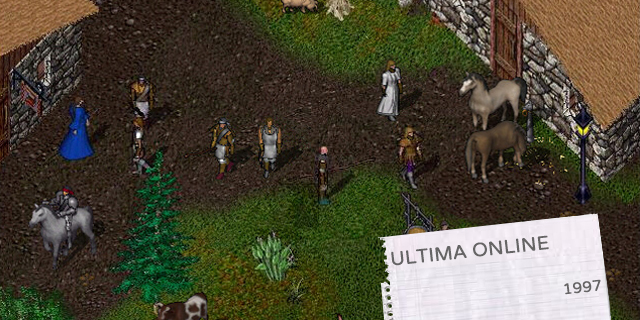
Exploring a fantasy world
 Released in 1997, Ultima Online showed us the core of a modern MMO. One of the hallmarks of early attempts in the genre was building a world with little narrative driving it; the game launched with few rules and few limits. The gameplay was almost entirely player-driven. There were lots of things to fight and craft, but players had to write their own story. Open PvP and player killing were part of this formula, and the balance between cooperative and competitive play would shape the genre going forward.
Released in 1997, Ultima Online showed us the core of a modern MMO. One of the hallmarks of early attempts in the genre was building a world with little narrative driving it; the game launched with few rules and few limits. The gameplay was almost entirely player-driven. There were lots of things to fight and craft, but players had to write their own story. Open PvP and player killing were part of this formula, and the balance between cooperative and competitive play would shape the genre going forward.
 Just like in life, in MMOs, you create your own stories within your world. Of course, not all games do this, as many are narrative-heavy and full of specific characters and events all experience. That’s important, too; without threads to hold things together, things are a bit too disjointed. How do MMOs balance this successfully?
Just like in life, in MMOs, you create your own stories within your world. Of course, not all games do this, as many are narrative-heavy and full of specific characters and events all experience. That’s important, too; without threads to hold things together, things are a bit too disjointed. How do MMOs balance this successfully?
 Often, this balance comes from knowning just how much story to reveal. Even Ultima Online had story, but much of it was left open for players to fill. Sometimes, the developers will follow along with what players have created and let that drive the direction of their story. One of the most interesting aspects of Ultima Online is how each server has its own unique history.
Often, this balance comes from knowning just how much story to reveal. Even Ultima Online had story, but much of it was left open for players to fill. Sometimes, the developers will follow along with what players have created and let that drive the direction of their story. One of the most interesting aspects of Ultima Online is how each server has its own unique history.
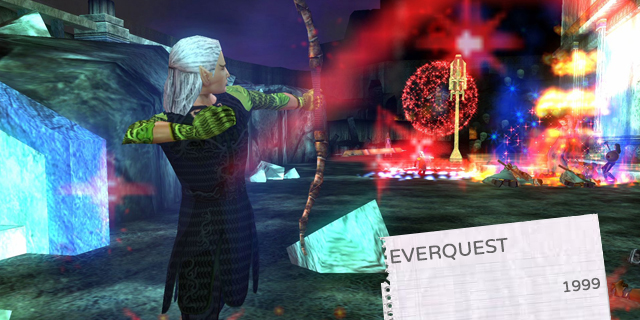
Creating modern conventions
 With the rise in both affordable limit-free Internet connections and dedicated video hardware, EverQuest could pick up where Ultima left off. Building a world in full 3D was a challenge in itself, before adding in the ability for it to handle hundreds of players. EverQuest became immensely successful, taking the cooperative aspects of what came before and added increasingly more complex settings and dungeons through a constant stream of expansion packs.
With the rise in both affordable limit-free Internet connections and dedicated video hardware, EverQuest could pick up where Ultima left off. Building a world in full 3D was a challenge in itself, before adding in the ability for it to handle hundreds of players. EverQuest became immensely successful, taking the cooperative aspects of what came before and added increasingly more complex settings and dungeons through a constant stream of expansion packs.
 EverQuest is still getting expansions, a testament to its longevity even in spite of its own successors. It’s likely because people have this connection to the MMO they’ve lived in, even if something else is objectively better. What do you think causes this bond?
EverQuest is still getting expansions, a testament to its longevity even in spite of its own successors. It’s likely because people have this connection to the MMO they’ve lived in, even if something else is objectively better. What do you think causes this bond?
 Often, an MMO will have some great game mechanics, yet the inevitable result is that players will start a game for these and stay for the social interaction. If a player has a group of like-minded friends who are active, it’s very likely that they will tolerate a game’s weaknesses and stick around.
Often, an MMO will have some great game mechanics, yet the inevitable result is that players will start a game for these and stay for the social interaction. If a player has a group of like-minded friends who are active, it’s very likely that they will tolerate a game’s weaknesses and stick around.
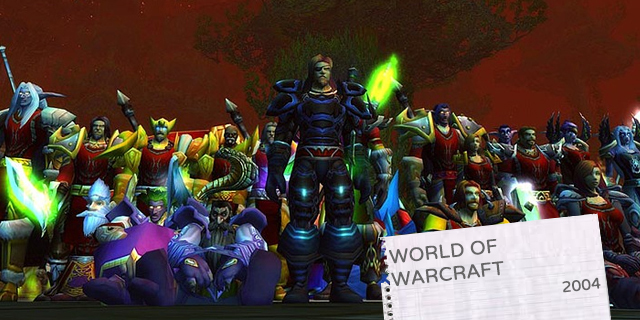
The once and future king?
 In true Blizzard fashion, it crafted a world with an incredible amount of detail that took the best of those that game before, while leaving behind a lot of what aggravated their players. At its core, it was a more directed and interactive world, with quests to guide players as they built up levels. The game is also more focused around a narrative, and the role the player characters take as events unfold in each new content patch. It topped the experience with a series of intricate large-scale raids to provide an end game experience that is now the industry standard.
In true Blizzard fashion, it crafted a world with an incredible amount of detail that took the best of those that game before, while leaving behind a lot of what aggravated their players. At its core, it was a more directed and interactive world, with quests to guide players as they built up levels. The game is also more focused around a narrative, and the role the player characters take as events unfold in each new content patch. It topped the experience with a series of intricate large-scale raids to provide an end game experience that is now the industry standard.
 World of Warcraft is now and will forever be known as a cultural behemoth. It did it with quite a peculiar world, frankly, with rich fantasy themes mixed with modern elements and pop culture references. Is this the winning formula? Is it important that a MMO not take its lore particularly seriously?
World of Warcraft is now and will forever be known as a cultural behemoth. It did it with quite a peculiar world, frankly, with rich fantasy themes mixed with modern elements and pop culture references. Is this the winning formula? Is it important that a MMO not take its lore particularly seriously?
 I think World of Warcraft offered a lot of small changes to common issues in other games. Above all, the core of the game’s huge success was timing. EverQuest was in decline, and a lot of players found their groups dwindling in numbers and started looking at newer games. Blizzard also managed to cultivate a new generation of fans from people who had never played an MMO, but knew the Warcraft name and its lore. Pop culture references were also brought over as a Warcraft staple. This was helped by the loosely-humorous lore that the series was known for, partly due to its beginnings as a potential Warhammer adaptation.
I think World of Warcraft offered a lot of small changes to common issues in other games. Above all, the core of the game’s huge success was timing. EverQuest was in decline, and a lot of players found their groups dwindling in numbers and started looking at newer games. Blizzard also managed to cultivate a new generation of fans from people who had never played an MMO, but knew the Warcraft name and its lore. Pop culture references were also brought over as a Warcraft staple. This was helped by the loosely-humorous lore that the series was known for, partly due to its beginnings as a potential Warhammer adaptation.
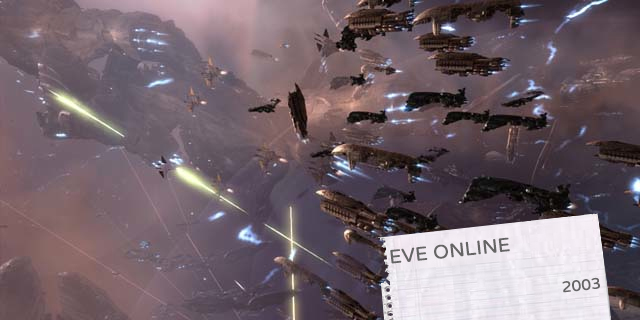
A real, active universe
 While many games stuck with the fantasy setting, EVE Online went in a different direction. Its sci-fi setting offered endless possibilities and few size limits. Its also put player interaction front and center, using it to drive events on a grand scale. EVE‘s narrative is very indirect, yet present. Plot elements are portrayed on the EVE site as news reports, and events will change due to player actions. Everything in EVE, from market prices to control over the majority of the territory in the game, is influenced by players.
While many games stuck with the fantasy setting, EVE Online went in a different direction. Its sci-fi setting offered endless possibilities and few size limits. Its also put player interaction front and center, using it to drive events on a grand scale. EVE‘s narrative is very indirect, yet present. Plot elements are portrayed on the EVE site as news reports, and events will change due to player actions. Everything in EVE, from market prices to control over the majority of the territory in the game, is influenced by players.
 EVE is the closest an MMO has really come to creating its own separate, coherent, persistent world with few real-world connections. People can really get lost in it, even forging profitable careers. What are the limits to this? Are there? Or will EVE (and games like it) be able to replicate and even replace most of real life for players?
EVE is the closest an MMO has really come to creating its own separate, coherent, persistent world with few real-world connections. People can really get lost in it, even forging profitable careers. What are the limits to this? Are there? Or will EVE (and games like it) be able to replicate and even replace most of real life for players?
 EVE is unique among MMOs for the freedom it offers to its players. From economy to territory, EVE players can largely do as they please in their universe, and it offers an interesting look at what people become when given few boundaries. Its economy is so realistic that CCP has an economist on staff as an advisor when planning game expansions and changes. Like the real world, the game’s economy is so integral that the rise and fall of commodity prices can have a profound effect on all of its players. EVE Online is, in a way, the only “true” MMO. With only one server, it really is a single world shared by thousands. I am not sure that any game can replicate or take the place of real life economically or socially, but EVE is probably the game that comes the closest to doing so.
EVE is unique among MMOs for the freedom it offers to its players. From economy to territory, EVE players can largely do as they please in their universe, and it offers an interesting look at what people become when given few boundaries. Its economy is so realistic that CCP has an economist on staff as an advisor when planning game expansions and changes. Like the real world, the game’s economy is so integral that the rise and fall of commodity prices can have a profound effect on all of its players. EVE Online is, in a way, the only “true” MMO. With only one server, it really is a single world shared by thousands. I am not sure that any game can replicate or take the place of real life economically or socially, but EVE is probably the game that comes the closest to doing so.
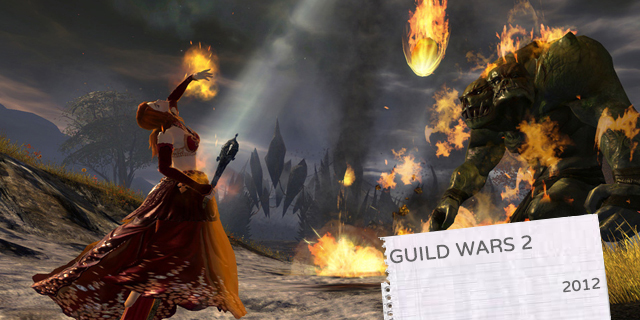
The ever-changing world
 MMOs, despite being built around constant change, tend to be rather stubborn about mechanics changes. Guild Wars 2 represents a generational shift. From how you pay for the game to how you level up, Guild Wars 2 changes up what everyone came to expect from the genre. From top to bottom, it reworked itself to promote cooperation between players. Random events and quests no longer required a player to be first to get credit, and players no longer competed to get the rewards from monster kills or crafting resources. The game also kept old content fresh by level scaling the entire game; events in lower level areas remained largely worthwhile for high level players. Finally, the removal of the monthly fee without having to pursue an aggressive microtransaction model made the game much more inviting to new players.
MMOs, despite being built around constant change, tend to be rather stubborn about mechanics changes. Guild Wars 2 represents a generational shift. From how you pay for the game to how you level up, Guild Wars 2 changes up what everyone came to expect from the genre. From top to bottom, it reworked itself to promote cooperation between players. Random events and quests no longer required a player to be first to get credit, and players no longer competed to get the rewards from monster kills or crafting resources. The game also kept old content fresh by level scaling the entire game; events in lower level areas remained largely worthwhile for high level players. Finally, the removal of the monthly fee without having to pursue an aggressive microtransaction model made the game much more inviting to new players.
 There have been so many experiments with the business models of MMOs, but one trend is clear: subscription fees are fading. Is there a place for a subscription MMO in the long term? Would the Guild Wars 2 model work genre-wide, or is it a special exception in a field doomed to be microtransaction-driven?
There have been so many experiments with the business models of MMOs, but one trend is clear: subscription fees are fading. Is there a place for a subscription MMO in the long term? Would the Guild Wars 2 model work genre-wide, or is it a special exception in a field doomed to be microtransaction-driven?
 I think that the microtransaction model looks great over the short term, and often brings results. Over the long term, though, the constant need for new players will eventually doom any such model. MMO players are known for investing for the long haul, and many would prefer to pay a monthly fee than be advertised at or limited due to a paywall. Guild Wars 2 has an up-front cost, but a cost that most of us are used to paying for most games. This helps a game recover its initial investment and some of the ongoing costs to maintain a game, improving quality while avoiding the need to pester players into using a microtransaction store. Guild Wars 2 does feature a store, but it is far less integral to the game than in a “free to play” game. I think one of the big lessons Guild Wars 2 teaches us and the industry is that you can do microtransactions well, and that having no fee doesn’t mean a game is a failure.
I think that the microtransaction model looks great over the short term, and often brings results. Over the long term, though, the constant need for new players will eventually doom any such model. MMO players are known for investing for the long haul, and many would prefer to pay a monthly fee than be advertised at or limited due to a paywall. Guild Wars 2 has an up-front cost, but a cost that most of us are used to paying for most games. This helps a game recover its initial investment and some of the ongoing costs to maintain a game, improving quality while avoiding the need to pester players into using a microtransaction store. Guild Wars 2 does feature a store, but it is far less integral to the game than in a “free to play” game. I think one of the big lessons Guild Wars 2 teaches us and the industry is that you can do microtransactions well, and that having no fee doesn’t mean a game is a failure.



















